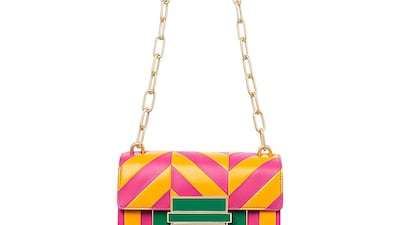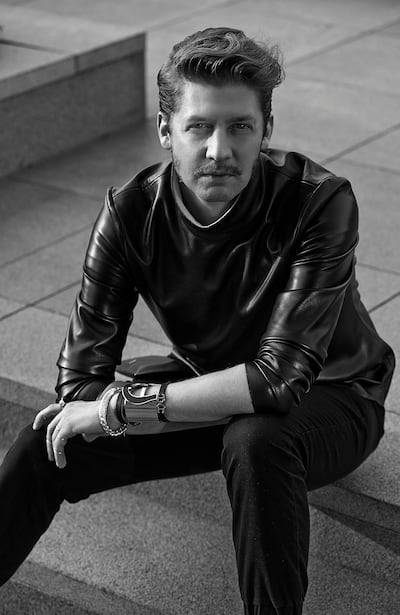Aigner Munich is a deeply intriguing company. In 1970s Germany, an Aigner was the bag to be seen with, while here in the UAE, until fairly recently, girls would receive an Aigner bag as an introduction to the world of elegant dressing. Yet, in spite of the brand's unquestionable quality and the fact that it has been around for 70 years, the name is still unfamiliar to many. Why? To answer that, you probably have to look back to the founder himself, Etienne Aigner.
Born in 1904, in what is now Slovakia, Aigner trained as a bookbinder in Budapest, before moving to Paris after the Second World War. There, he began to experiment with using the book presses on leather to create belts, cardholders and bags. This led to Aigner being asked to make pieces for the couture houses of Christian Dior, Lanvin and Cristóbal Balenciaga.
Flushed with success, in 1950, Aigner decamped to New York, set-up his own boutique in Manhattan and, in a move that would ultimately prove disastrous, sold his designs to a local manufacturer. Almost immediately, the two men clashed over production methods: Aigner wanted to retain a sense of the handmade, while the American was eager to go down the cheap, mass-production route.
Unable to resolve professional differences, Aigner left the United States and retreated to Germany, establishing a second self-titled company in Munich. Fast forward to today and, somewhat confusingly, both Aigner companies still exist, both make leather bags, and thanks to search-engine-savvy wording, the American incarnation comes up first online, with its mass-produced shelf fillers. Aigner Munich, meanwhile, follows the original ethos of quality and produces more than a third of its bags by hand.
Aigner Munich's creative director, Christian Beck, was in Dubai last week to launch a new bag in collaboration with Kuwaiti influencer Ascia Al Faraj. We couldn't resist asking if having one name spread between the two companies presented a challenge for him and his team. "Hmmm, it is a pity," Beck laughs. "I wasn't born when he sold the company, so I couldn't interrupt him. We are not linked in any way, but I have been watching Etienne Aigner USA for a long time. It's very small and it's a different brand. We are Aigner Munich, so I just go ahead. It's not frustrating, but rather that we are creating a vision of how it might be in the future".
Unclear if Beck was hinting at a future merger between the two (and a world exclusive for me) or is just sanguine; it does, however, offer a hint at why, in a notoriously fickle industry, Beck has lasted 10 years with one company. "I have known the CEO of Aigner Munich, Mrs Sybille Schoen, for 15 years," Beck explains. "I was working for her, fresh out of college, maybe 15 years ago, and when Mrs Schoen went to Aigner, she called me and asked if I would like to join her," he tells me.
That was in 2008, and by 2010, Beck had been named head of leather and accessories. In 2012, he was appointed as the company’s head of design. “We are very good working together,” he continues. “I have known her so long and she knows me, and she lets me be. She has watched my development as a designer the whole time, and she supports me, which is very important. There are so many changes [in fashion] at the moment, and everyone is being squeezed like a lemon. It’s not an anonymous thing, of just going to the office and doing my sketches. No, this is something that is really a part of my life. We have grown together. I feel really at home.”
It is not often one hears a designer describe a label as home, but perhaps this offers a clue to Beck’s success and longevity – he and his team manage to infuse each collection with a sense of the pleasingly familiar. Each season, Beck puts out collections that are filled with tactile bags, in sensual and ergonomic shapes, that sit comfortably around and against the body. He has an inherent understanding of the unique qualities of leather as an evolving surface that ages with use and takes on the body heat of the wearer.
Chosen badly, a bag will languish in a cupboard, but the right purchase becomes an extension of a woman's personality. Taking this notion to heart, Beck chose love as the theme for Aigner's spring/summer 2018 collection. "These days, I think love is really important. Everything is getting mixed up and people are losing their traditions, but now it is coming back. People need to believe in love, in family and in traditions again."
The collection is filled with bold, bright colours that clash and leap off the bags. Cross- body bags feel young and sassy, and ready to be slung over a shoulder, while purses are emblazoned with the word "love", picked out in repeating font, like a happy mantra. Underpinning the pinks, oranges and vibrant greens, however, are small, perfect stitches, running in precise and tidy rows – the immaculate work of the unseen maker.
"We still make 35 to 40 per cent of our bags near Florence, in a little village called Signia. We have worked together with same factory for about 30 years. The guy leading the company is about 75, and we have these Italian women who do the hand sewing. When I go there, it is the opposite of technology, it's all handcrafted. And that's what I like. When I go to the Italians with a creative project, they just do it. They try it, experiment – with weaving
and beading. It's such a creative process and gets very emotional."
Described as a German company with an Italian soul, Aigner Munich is a unique meld of northern European practicality and Italian passion, encapsulated by Beck’s insistence on learning Italian to better communicate with his artisans. The link to Italy extends beyond the bags. The company’s silk scarves are all handmade near Como, while the ready-to-wear collection is shown during Milan Fashion Week.
“I like the contrast,” he says. “Germans, we are very on point – maybe sometimes a little too much – and Italians are all about enjoying their life. You can find technology and new ideas everywhere, but you cannot find that great combination of emotion and product like Italy.”
In retaining these small-scale factories, Aigner Munich has, deliberately or not, chosen to focus on smaller product runs, but ones that offer better choice. "In these times of fast fashion, clothes are changing so fast. To keep creating a product that is resistant, retained in the closet, and not changed every two weeks, for me this is the most important thing," Beck explains.
“I think the creative process is a very intimate thing, and I don’t want 30 guys to run after and keep focused. I prefer to have three or four bag designers with me, a designer for scarves, for women’s wear, and some product designers, and I keep all the strings together. It is a lot but it’s not a problem, because I have the whole collection in my mind already.”
The ability to have a full collection finished mentally before briefing a design team is impressive, and I point out that the only other designer to work that way is none other than the head of Fendi and Chanel – and fellow German – Karl Lagerfeld. Beck laughs out loud. “Does he? Maybe it is a German thing. Ask me again when I am 80, perhaps”.
___________________
Read more:
Tomas Maier turns to film for Bottega Veneta's latest campaign
The best of Paris Haute Couture Week
Ahead of Middle East expansion, Net-a-Porter teams up with Ascia Al-Faraj


